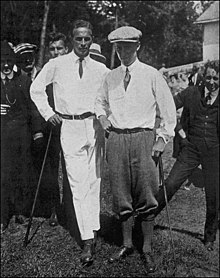|
Chick Evans
Charles E. "Chick" Evans Jr. (July 18, 1890 – November 6, 1979) was a prominent American amateur golfer of the 1910s and 1920s. Evans, who won the 1910 Western Open, became the first amateur to win both the U.S. Open and U.S. Amateur in one year, a feat he achieved in 1916. Evans won the U.S. Amateur again in 1920, and was runner-up three times. Selected to the Walker Cup team in 1922, 1924, and 1928, he competed in a record 50 consecutive U.S. Amateurs in his long career. Evans achieved all of this while carrying only seven hickory-shafted clubs. In addition to his golf career, Evans is known for founding the Evans Scholars Foundation, which provides a college scholarship for qualified caddies. In 1960, Evans was voted the Bob Jones Award, the highest honor given by the United States Golf Association in recognition of distinguished sportsmanship in golf. He is a member of the World Golf Hall of Fame. Early lifeBorn in Indianapolis, Indiana, Evans' family moved to Chicago when he was eight years old, and he grew up on the north side of the city. His father, Charles Evans, was one of the most influential librarians of the 20th century. At the age of eight, he was first exposed to golf as a caddie at a Chicago course, the Edgewater Golf Club. He attended secondary school at the Evanston Academy, and won the 1907 and 1908 Western Interscholastic tournaments. He led in the founding of the Western Interscholastic Golf Association (WIGA), and led Evanston Academy to the 1908 WIGA team championship.[2] Golf career From these beginnings, Evans became one of the most acclaimed American amateur golfers of his time. The accomplishment that gave him the most contemporary publicity came in 1916, when he won both the U.S. Amateur and U.S. Open in the same year. Evans was the first person to accomplish this task, and only Bobby Jones has done it since. Evans also won the Western Open in 1910 by defeating George Simpson 6 and 5 in the 36-hole final. He was the only amateur to do so until Scott Verplank in 1985.[3] Simpson graciously praised Evans on his victory, saying “I’ve learned the greatest golf lesson of my life today. I consider it a greater honor to be beaten by the kind of golf you have played than to have remained out of the tournament because I did not fancy match play.”[4] Into the 1960s, Evans was an active participant in senior tournaments, and still competed in U.S. Amateur events, eventually setting a record of completing 50 of these championships. Evans played his last rounds of competitive golf in 1968, winning the Illinois Open that year. His last Western Amateur was in 1967.[1] After his retirement, Evans continued to attend events as a spectator and converse with the fans and players. Evans Scholars FoundationAfter his wins in 1916, Evans was given several thousand dollars in royalties for recording golf instructions for the Brunswick Record Company, and in 1921 he received royalties from a golf book.[5] If he had accepted this money Evans would have lost his amateur status. His mother suggested that he put the money to good use by sponsoring a scholarship fund for caddies. Evans, who was unable to finish his own matriculation at Northwestern University, recalled that his mother "wouldn't think of accepting my money unless we could arrange it to be trusted to furnish educations for deserving qualified caddies." He said his mother "pointed out that the money came from golf and thus should go back into golf -- It was all her dream -- her idea." Evans went to the Western Golf Association (WGA), an organization that ran the golf championships in the Midwest, to get their support for his scholarship. By 1930, the Evans Scholars Foundation had formed[3] and two caddies, Harold Fink and Jim McGinnis, were named the first two Evans Scholars. Chick Evans' long friendship with Chicago tax attorney, Carleton Blunt, had proved to be the catalyst for launching the Evans Scholars Foundation. Blunt, an avid golfer and philanthropist, supported Evans' vision for helping caddies attend colleges and universities across the country by raising the necessary funds for decades. The criteria used to choose the recipients were scholarship, fellowship and leadership. Since that time, over 10,600 caddies have become Evans Scholars and attained college educations. The Evans scholarship program continues today as the largest scholarship organization in sports and the largest privately funded scholarship program in the United States. Evans Scholarship houses exist at the following Universities: University of Colorado, University of Illinois, Northwestern University, Marquette University, University of Wisconsin, Purdue University, Ohio State University, Northern Illinois University, University of Missouri, Indiana University, University of Michigan, Michigan State University, Miami University and the University of Minnesota. On February 19, 2014, the Evans Scholars Foundation announced their plans to build a new chapter house at the University of Oregon. It is the first new Scholarship House in 27 years.[6] In addition to those universities at which houses exist, scholarship recipients attend several other universities around the country. More than 800 caddies currently attend college on an Evans Scholarship. Death and legacyEvans died on November 6, 1979, at age 89. His wife, Esther, had died in 1967 after 40 years of marriage. They had no children.[1] The Chick Evans Golf Course in Morton Grove, a north suburb of Chicago, is named in his honor. Tournament wins (22)
Professional major championships Wins (1)
Results timelineNote: As an amateur, Evans was ineligible to play in the PGA Championship.
Win
Top 10
Did not play
LA = Low amateur Amateur major championshipsWins (2)
Results timeline
Win
Top 10
Did not play
M = Medalist Sources: Amateur Championship: 1911,[8] 1914,[9] 1921,[10] 1926,[11] 1946,[12] 1949,[13] 1950,[14] 1952,[15] 1953,[16] 1955[17] U.S. national team appearancesAmateur
References
External linksWikimedia Commons has media related to Chick Evans.
|
|||||||||||||||||||||||||||||||||||||||||||||||||||||||||||||||||||||||||||||||||||||||||||||||||||||||||||||||||||||||||||||||||||||||||||||||||||||||||||||||||||||||||||||||||||||||||||||||||||||||||||||||||||||||||||||||||||||||||||||||||||||||||||||||||||||||||||||||||||||||||||||||||||||||||||||||||||||||||||||||||||||||||||||||||||||||||||||||||||||||||||||||||||||||||||||||||||||||||||||||||||||||||||||||||||||||||||||||||||||||||||||||||||||
